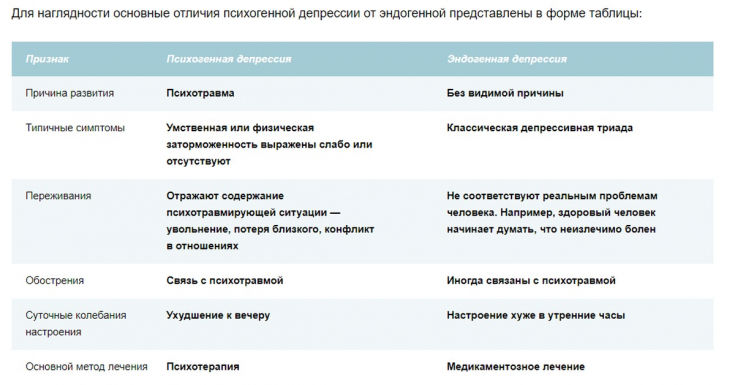Endogenous depression appears as if out of the blue. Everything is relatively good in a person’s life, there are no traumatic events or prolonged stress, but he lives in a vacuum of his own anxiety, fears, apathy and fatigue. All this reaches such forms that a person does not have the strength to think and move. For no apparent reason, he loses the ability to enjoy life and is engaged in self-eating and self-destruction. Psychologists say that it's still worth looking for the cause, otherwise the treatment may not help.
- Endogenous depression: what causes it and how it manifests
- Causes of endogenous depression
- Treatment of endogenous depression: an integrated approach
- Methods of treating endogenous depression
Endogenous depression: what causes it and how it manifests
Depression — a disease that is caused by more than one or two factors. This is a whole complex of problems that falls on a person: from childhood events to social causes. But in one case, the trigger for a depressive state is a traumatic event, illness, death, stress, conflict. Such depression is called psychogenic, i.e. one triggered by external events.
Endogenous depression is caused by the internal state of a person. At first glance, it may seem that there are no serious reasons for her. The person did not experience any unpleasant events, but life ceased to bring joy. You can recognize this condition in yourself or loved ones by the presence of specific symptoms.
Read also: How to help loved ones with depression: 5 important rules
1. Feeling sad
A person constantly feels depressed, unable to enjoy even very pleasant events in his life. He is overcome by longing, the reasons for which he cannot name. Often in the morning the longing is much stronger than in the evening.
2. Heightened anxiety
Anxiety is accompanied by anxiety, which can reach & nbsp; panic attacks. Sometimes this is manifested by pain in the chest, muscles, stomach.
3. Mental and motor retardation
A patient with endogenous depression feels constantly tired, speaks slowly, thinks, and may freeze for a long time in one position. He needs much more time to absorb any information and all the willpower to think faster. No amount of rest adds to his energy and vigour.
4. Guilt and self-criticism
Low self-esteem provokes a constant feeling of guilt. The world seems to be a hostile and gloomy place, and sick — the most useless person in he, who has no future. Time seems to slow down for him. A person is engaged in condemning himself, criticizing and blaming.
5. Suicidal tendencies
With endogenous depression, the risk that the patient will want to commit suicide is quite high. Only lack of energy and strength can keep him from a desperate step.
Read also: Postpartum depression: 5 causes and 8 ways to cope
6. Violation of sleep, appetite and attention
The patient cannot sleep, but wakes up early, cannot concentrate on anything. Appetite may be absent or excessive.

It is believed that since endogenous depression is not accompanied by a specific trauma, event, stress, then its causes must be sought in the failure of the patient's body.
Causes of endogenous depression
-
Genetics. Serotonin, dopamine and norepinephrine are responsible for our mood. Their lack can be inherited. Important: if the environment in which such a person lives is prosperous, then depression may not occur.
-
Thyroid disease, when there is also a lack of serotonin, dopamine and norepinephrine.
-
Neurological pathologies of early childhood.
-
Certain character traits fall into the risk group: pedantry, self-doubt, increased responsibility, conscientiousness, a sense of duty.
Treatment of endogenous depression: an integrated approach
With endogenous depression, the patient's condition gradually worsens. Without treatment, he develops phobias, delusional ideas (predicting fatal illnesses, retribution, death), anxiety and anxiety worsen. Suicide becomes an obsession and is seen as the only way to alleviate his condition.
Despite the severe symptoms and severity of the disease itself, endogenous depression responds well to treatment. However, experts warn that you should not be limited to just one pill. The mechanism of depression is complex enough to rely on medication alone.

Read also: Stendhal Syndrome: When Beauty Becomes Dangerous
The peculiarity of endogenous depression is that its causes do not lie on the surface and may not be associated with external events. Sources of unreasonable longing and anxiety must be sought in characteristics, childhood experience, family relationships.
If you suspect this is a psychological disorder, you should contact a psychiatrist. He will conduct a conversation, clarify the symptoms, observe the patient's behavior and conduct tests that are aimed at identifying depression. May recommend that evaluation by an endocrinologist and neurologist for medical conditions that worsen depressive symptoms.
Methods of treating endogenous depression
-
Prescribing antidepressants and normothymics.They help patients get rid of thoughts of suicide, improve mood, motor and mental activity.
-
Passing psychotherapy sessions, without which drug treatment may not give lasting results. Cognitive-behavioral and psychodynamic psychotherapy have proved to be the most effective in the treatment of endogenous depression. Psychotherapy allows you to identify the hidden causes of depression and work through them, and also teaches the patient to independently cope with stress in his life.
If there is a hereditary predisposition to endogenous depression, then it may return. In this case, it is necessary to pay special attention to stressful situations in life and to avoid everything that can harm .
Read also: Why there is no holiday mood and how to get it: the dangers of «New Year depression»
You may be interested in: Memory Test.






Add a comment